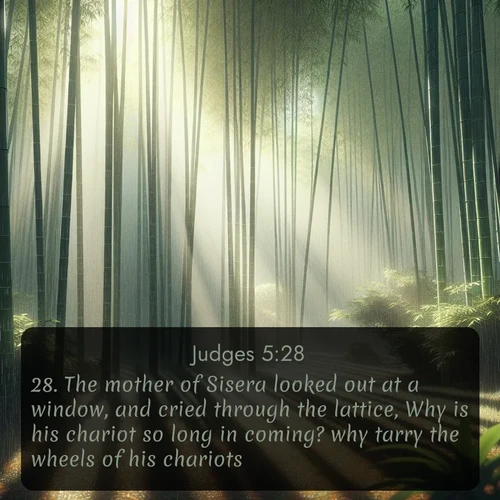Judges 5:28 plusieurs versions / traductions
English Bible Translations
28. The mother of Sisera looked out at a window, and cried through the lattice, Why is his chariot so long in coming? why tarry the wheels of his chariots?
28. Through the window she looked forth, and cried, The mother of Sisera [cried] through the lattice, Why is his chariot so long in coming? Why tarry the wheels of his chariots?
28. Looking out from the window she gave a cry, the mother of Sisera was crying out through the window, Why is his carriage so long in coming? When will the noise of his wheels be sounding?
28. Them other of Sisera looketh out at the window, And crieth through the lattice, Why is his chariot so long in coming? Why tarry the trampings of his chariots?
28. The mother of Sisera looked out at a window, and cried through the lattice, Why is his chariot so long in coming? why tarry the wheels of his chariots?
28. Through the window she hath looked out -- Yea, she crieth out -- the mother of Sisera, Through the lattice: Wherefore is his chariot delaying to come? Wherefore tarried have the steps of his chariot?
German Bible Translations
28. Die Mutter Siseras sah zum Fenster hinaus und heulte durchs Gitter: Warum verzieht sein Wagen, daß er nicht kommt? Wie bleiben die Räder seiner Wagen so dahinten?
28. Die Mutter Siseras sah durchs Fenster und schrie klagend durchs Gitter: Warum kommt sein Wagen so lange nicht? Warum verspätet sich also sein Gespann?
French Bible Translations
28. Par la fenêtre, à travers le treillis, la mère de Sisera regarde et s'écrie: 'Pourquoi son char tarde-t-il à venir? Pourquoi ses chars vont-ils si lentement?'
28. Par la fenêtre, à travers le treillis,La mère de Sisera regarde, et s’écrie:Pourquoi son char tarde-t-il à venir?Pourquoi ses chars vont-ils si lentement?
28. Par la fenêtre, à travers le treillis, La mère de Sisera regarde, et s'écrie: Pourquoi son char tarde-t-il à venir? Pourquoi ses chars vont-ils si lentement?
28. La mère de Sisera regarde par la fenêtre, et s'écrie à travers le treillis: Pourquoi son char tarde-t-il à venir? Pourquoi la marche de ses chars est-elle si lente?
28. La mère de Sisera regardait par la fenêtre, et s'écriait [en regardant] par les treillis : Pourquoi son char tarde-t-il à venir? Pourquoi ses chariots vont-ils si lentement?
28. La mère de Sisera regarde par la fenêtre, et s'écrie, à travers le treillis: Pourquoi son char tarde-t-il à venir? Pourquoi ses chars vont-ils si lentement?
Versions with Strong Codes
Judges 5 / KJV_Strong28.
Strong Code definitions
H517 'em ame a primitive word; a mother (as the bond of the family); in a wide sense (both literally and figuratively (like 1):--dam, mother, X parting.see H1
H5516 Ciycra'; see-ser-aw' of uncertain derivation; Sisera, the name of a Canaanitish king and of one of the Nethinim:--Sisera.
H8259 shaqaph shaw-kaf' a primitive root; properly, to lean out (of a window), i.e. (by implication) peep or gaze (passively, be a spectacle):-- appear, look (down, forth, out).
H1157 b`ad beh-ad' from H5704 with prepositional prefix; in up to or over against; generally at, beside, among, behind, for,etc.:--about, at by (means of), for, over, through, up (-on), within.see H5704
H2474 challown khal-lone' a window (as perforated):--window.
H2980 yabab yaw-bab a primitive root; to bawl:--cry out.
H1157 b`ad beh-ad' from H5704 with prepositional prefix; in up to or over against; generally at, beside, among, behind, for,etc.:--about, at by (means of), for, over, through, up (-on), within.see H5704
H822 'eshnab esh-nawb' apparently from an unused root (probably meaning to leave interstices); A latticed window:--casement, lattice.
H4069 madduwa` mad-doo'-ah or madduaa {mad-doo'-ah}; from H4100 and the passive participle of H3045; what (is) known?; i.e. (by implication) (adverbially) why?:--how, wherefore, why.see H4100 see H3045
H954 buwsh boosh be ashamed; also (by implication) to be disappointed or delayed:--(be, make, bring to, cause, put to, with,a-)shamed(-d), be (put to) confounded(-fusion), become dry, delay, be long.
H7393 rekeb reh'-keb from H7392; a vehicle; by implication, a team; by extension, cavalry; by analogy a rider, i.e. the uppermillstone:--chariot, (upper) millstone, multitude (from the margin), wagon.see H7392
H954 buwsh boosh be ashamed; also (by implication) to be disappointed or delayed:--(be, make, bring to, cause, put to, with,a-)shamed(-d), be (put to) confounded(-fusion), become dry, delay, be long.
H935 bow' bo a primitive root; to go or come (in a wide variety of applications):--abide, apply, attain, X be, befall, + besiege, bring (forth, in, into, to pass), call, carry, X certainly, (cause, let, thing for) to come (against, in, out, upon, to pass), depart, X doubtless again, + eat, + employ, (cause to) enter (in, into, -tering, -trance, -try), befallen, fetch, + follow, get, give, go (down, in, to war), grant, + have, X indeed, (in-)vade, lead, lift (up), mention, pull in, put, resort, run (down), send, set, X (well) stricken (in age), X surely, take (in), way.
H4069 madduwa` mad-doo'-ah or madduaa {mad-doo'-ah}; from H4100 and the passive participle of H3045; what (is) known?; i.e. (by implication) (adverbially) why?:--how, wherefore, why.see H4100 see H3045
H309 'achar aw-khar' a primitive root; to loiter (i.e. be behind); by implication to procrastinate:--continue, defer, delay, hinder, be late (slack), stay (there), tarry (longer).
H6471 pa`am pah'-am or (feminine) pa;amah {pah-am-aw'}; from H6470; a stroke, literally or figuratively (in various applications, as follow):--anvil, corner, foot(-step), going, (hundred-)fold, X now, (this) + once, order, rank, step, + thrice, ((often-)), second, this, two) time(-s), twice, wheel.
H4818 merkabah mer-kaw-baw' feminine of H4817; a chariot:--chariot. See also 1024. see H4817see H1024
Prédications qui analysent les thèmes Juges 5
Thèmes : Cantique de Débora; Victoire sur SiseraRelated Sermons discussing Judges 5
Themes : Cantique de Débora; Victoire sur Siserasee also: Bible Key Verses ; KJV Bible Images, BBE Bible images

